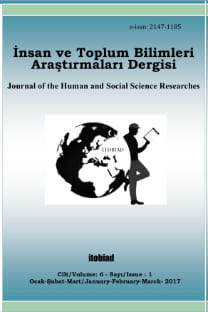Çevresel Gerontoloji Bağlamında ‘Yerinde Yaşlanma’nın Temel Belirleyicileri ve Aktif Yaşlanma Süreciyle İlişkisi
Yerinde Yaşlanma, Çevresel Gerontoloji, Mekân, Sosyal Bağlılık, Aktif Yaşlanma.
Basic Determinants of ‘Aging in Place’ in the Context of Environmental Gerontology and Its Correlation with the Process of Active Aging
Aging in Place, Environmental Gerontology, Place, Social Adherence, Active Aging.,
___
- Alders, P., & Schut, F. (2019). Trends in ageing and ageing-in-place and the future market for institutional care: Scenarios and policy implications. Health Economics, Policy and Law, 14(1), 82-100.
- Alidoust, S., Bosman, C., & Holden, G. (2019). Planning for healthy ageing: How the use of third places contributes to the social health of older populations. Ageing and Society, 39(7), 1459-1484.
- Antonietti, A., Balconi, M., Catellani, P., & Marchetti, A. (2014). Empowering Skills for an Active Ageing and Healthy Living. In C. Grassi, P. A. Marsan, & G. Riva (eds.), Active Ageing and Healthy Living : A Human Centered Approach in Research and Innovation As Source of Quality of Life. Amsterdam, Netherlands: IOS Press, 157-171.
- Barrett, P., Hale, B., & Gauld, R. (2012). Social inclusion through ageing-in-place with care? Ageing and Society, 32(3), 361-378.
- Dahlberg, L. (2019). Ageing in a changing place: A qualitative study of neighbourhood exclusion. Ageing and Society, 1-19.
- Dupuis-Blanchard, S.,& Gould, O. (2018). Nursing Homes Without Walls for Aging in Place. Canadian Journal on Aging / La Revue Canadienne Du Vieillissement, 37(4), 442-449.
- Gorczyca, K.,& Grabinski, T. (2018). Ageing in place: Residential satisfaction in Polish housing-estate communities. Ageing and Society, 38(12), 2410-2434.
- Grassi, C., Marsan, P. A., & Riva, G. (2014). Active Ageing and Healthy Living : A Human Centered Approach in Research and Innovation As Source of Quality of Life. Amsterdam, Netherlands: IOS Press.
- Hillcoat-Nalletamby, S.,& Ogg, J. (2014). Moving beyond ‘ageing in place’: Older people's dislikes about their home and neighbourhood environments as a motive for wishing to move. Ageing and Society, 34(10), 1771-1796.
- Johansson, K., Josephsson, S., & Lilja, M. (2009). Creating possibilities for action in the presence of environmental barriers in the process of ‘ageing in place’. Ageing and Society, 29(1), 49-70.
- Peace, S., Holland, C., & Kellaher, L. (2011). ‘Option recognition’ in later life: Variations in ageing in place. Ageing and Society, 31(5), 734-757.
- Ricciardi, W., Specchia M. L., & Marino, M. (2014). Health of the Elderlies and Healthy Ageing: A Challenge for Europe. In C. Grassi, P. A. Marsan, & G. Riva (eds.), Active Ageing and Healthy Living : A Human Centered Approach in Research and Innovation As Source of Quality of Life. Amsterdam, Netherlands: IOS Press, 1-9.
- Riva, G., Gaggioli, A., Villani, D., Cipresso, P., Repetto, C., Serino, S., Triberti, S., Brivio, E., Galimberti, C,, & Graffigna, G. (2014). Positive Technology for Healthy Living and Active Ageing. In C. Grassi, P. A. Marsan, & G. Riva (eds.), Active Ageing and Healthy Living : A Human Centered Approach in Research and Innovation As Source of Quality of Life. Amsterdam, Netherlands: IOS Press, 44-56.
- Rossi, G., Boccacin, L., Bramanti, D., & Meda, S. G. (2014). Active Ageing: Intergenerational Relationships and Social Generativity. In C. Grassi, P. A. Marsan, & G. Riva (eds.), Active Ageing and Healthy Living : A Human Centered Approach in Research and Innovation As Source of Quality of Life. Amsterdam, Netherlands: IOS Press, 57-68.
- Rossini, P. M. & Marra, C. (2014). Demographic Changes and the Challenge for a Healthy Ageing. In C. Grassi, P. A. Marsan, & G. Riva (eds.), Active Ageing and Healthy Living : A Human Centered Approach in Research and Innovation As Source of Quality of Life. Amsterdam, Netherlands: IOS Press, 23-31.
- Scharlach, A. E. & Moore, K. D. (2016). Aging in Place. In V. L. Bengtson, R. A. Settersten, B. K. Kennedy, N. Morrow-Howell, & J. Smith (eds.), Handbook of Theories of Aging, Third Edition (Vol. Third edition). New York, NY: Springer Publishing Company, 239-249.
- Van Dijk, H., Cramm, J., Van Exel, J., & Nieboer, A. (2015). The ideal neighbourhood for ageing in place as perceived by frail and non-frail community-dwelling older people. Ageing and Society, 35(8), 1771-1795.
- Wadu Mesthrige, J.,& Cheung, S. (2019). Critical evaluation of ‘ageing in place’ in redeveloped public rental housing estates in Hong Kong. Ageing and Society, 1-34.
- Yung, E. H. K., Conejos, S., & Chan, E. H. W. (2016). Social needs of the elderly and active aging in public open spaces in urban renewal. Cities, 52 (2016), 114–122.
- ISSN: 2147-1185
- Yayın Aralığı: Yılda 4 Sayı
- Başlangıç: 2012
- Yayıncı: Mustafa SÜLEYMAN ÖZCAN
Özbekistan’da Sovyetler Dönemi Kur’an-ı Kerim Tercüme Faaliyetleri (Şark Yulduzı Dergisi Örneği)
Avrupa Birliği ve Türkiye’nin Yumuşak Güç Potansiyellerinin Mukayeseli Analizi
AYHAN NURİ YILMAZ, GÖKMEN KILIÇOĞLU
Likiditenin Borç Üzerine Etkisi: Otomotiv Firmalarında Bir Uygulama
Milliyetçilik Anlayışının; Atatürk Dönemi Türk Yönetim Sistemine Yansımaları
Büyükşehir Belediyeleri ve Sosyal Hizmet: Kocaeli Büyükşehir Belediyesi Üzerine Bir İnceleme
Türkiye’nin Demir Çelik Sektörünün Rekabet Gücünün Karşılaştırmalı Analizi
HAYRETTİN KESGİNGÖZ, SERKAN DİLEK, Muharrem YELDAN
2018 Genel Seçimleri Odaklı TV’de Yayımlanan Siyasal Reklamların Çekicilikler Bağlamında Analizi
ÇİĞDEM ÇALAPKULU, Yasin BOZDEMİR
Açığa Satış Fiyatının Belirleyicileri: Borsa İstanbul Mali Endeksi (XUMAL) Üzerinde Bir Uygulama
İHSAN ÇAPCIOĞLU, Ahmed Hamza ALPAY
